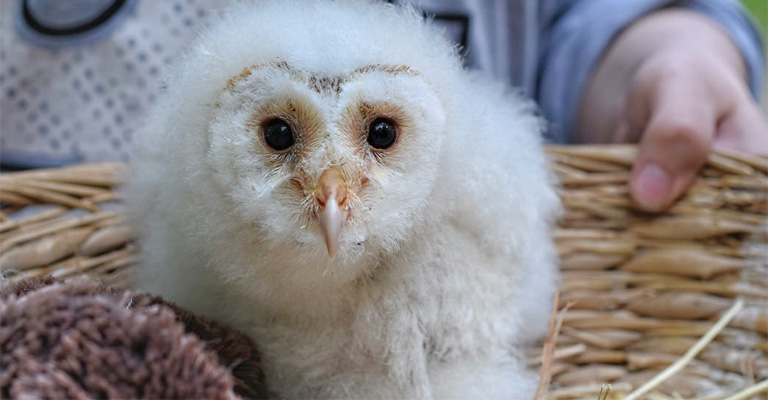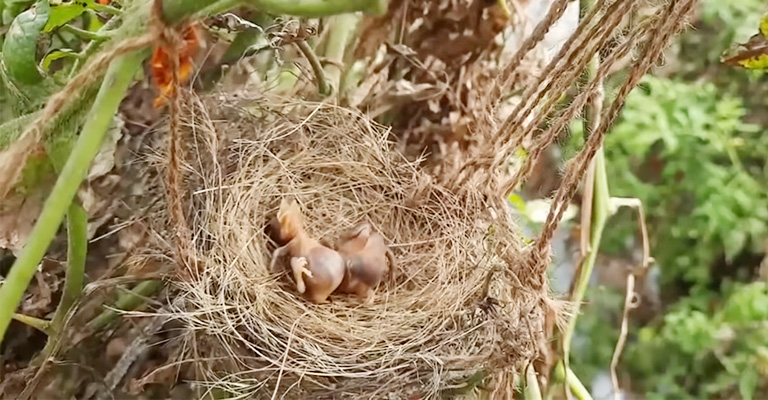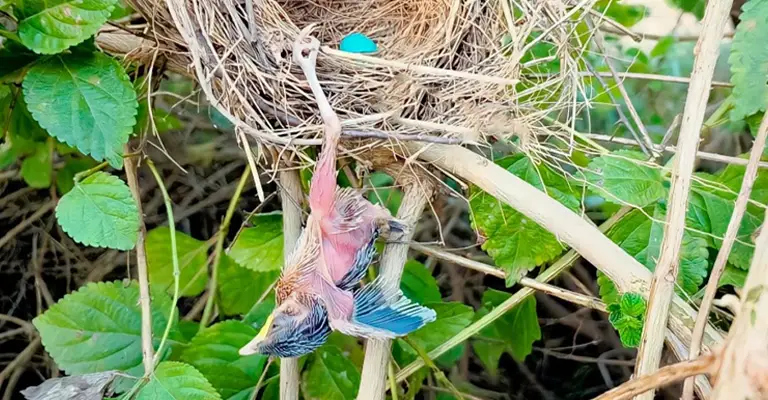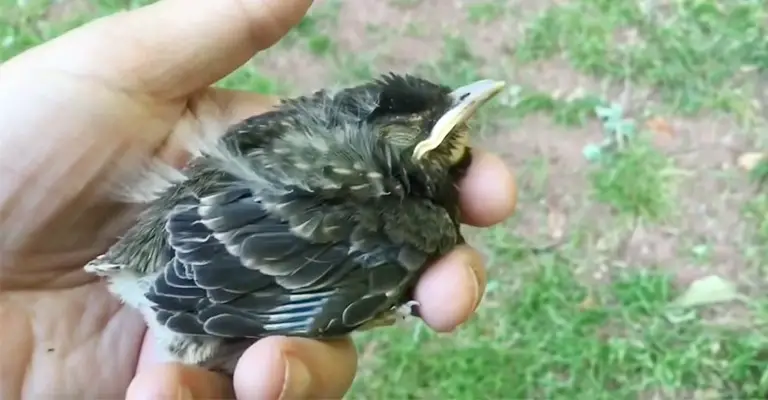The sight of a baby bird on the ground, seemingly helpless and vulnerable, can evoke both curiosity and concern. Many people wonder why these young birds end up outside their nests, and whether it is a cause for alarm or intervention.
The truth is, the phenomenon of baby birds falling out of nests is a natural occurrence that serves an important purpose in their development.
Understanding why do baby birds fall out of nests can help us appreciate the intricacies of avian life and make informed decisions when encountering such situations.
In this article, we will explore the various factors that contribute to baby birds leaving their nests prematurely.
By gaining insight into this fascinating aspect of avian biology, we can better appreciate the resilience and adaptability of these young creatures as they navigate their way into the world.

Why Do Baby Birds Fall Out of Nest?
Baby birds can fall out of their nests for various reasons. Here are ten possible explanations:
Inadequate Nest Structure
Some nests may be poorly constructed or made from unstable materials, such as twigs or leaves. These nests can easily break apart or collapse, causing the baby birds to fall out.
Nest Overcrowding
As baby birds grow, the nest can become crowded, especially in species that lay large clutches of eggs. With limited space, some chicks may accidentally push or jostle their siblings out of the nest.
Nest Disturbance
Human activity or the presence of other animals near the nest can cause baby birds to panic. In their attempt to escape perceived danger, they may lose their balance and fall out of the nest.
Nest Predation
Nests are vulnerable to predators such as squirrels, snakes, or other birds. When a predator attacks the nest, the baby birds instinctively try to flee, often resulting in them falling out.
Nest Collapse
Nests built in precarious locations or with weak materials are prone to collapsing. This can occur due to strong winds, heavy rain, or simply the weight of growing chicks, causing the baby birds to be dislodged.
Nest Parasites

Some bird species, like the cuckoo, are brood parasites. They lay their eggs in the nests of other birds, tricking the host parents into raising their young.
The parasitic chicks may push the host’s offspring out of the nest to secure more resources for themselves.
Inexperience
Young birds that have recently fledged may still be developing their flying skills. As they explore their surroundings, they may misjudge their abilities and accidentally fall out of the nest.
Extreme Weather
Harsh weather conditions, such as strong winds or heavy rain, can cause nests to sway or become damaged. The instability can lead to baby birds being dislodged and falling to the ground.
Sibling Rivalry
In nests with multiple chicks, competition for food can be intense. Siblings may engage in aggressive behavior, such as pecking or pushing, which can result in some chicks being pushed out of the nest.
Disease or Weakness
Baby birds that are sick or weak may lack the strength or coordination to stay in the nest. Their compromised condition makes them more prone to falling out, even with minimal disturbance.
It’s important to note that while baby birds falling out of nests is relatively common, it doesn’t necessarily mean they are in immediate danger.
In many cases, the parents continue to care for the fallen chicks on the ground until they are ready to fledge or are able to return to the nest.
However, if you come across a fallen baby bird, it’s best to contact a local wildlife rehabilitator for guidance on how to assist them properly.
What to Do If Baby Birds Fall Out of Nest?

If you come across baby birds that have fallen out of their nest, here are some steps you can take to ensure their safety:
Assess the Situation
Observe the area and determine if the baby birds are in immediate danger. Look for signs of predators, busy roads, or other hazards that could harm them.
Leave Them Be
In many cases, baby birds that have fallen out of the nest are not in immediate danger and their parents are still caring for them. It’s best to leave them alone and monitor them from a distance to see if the parents return.
Create a Temporary Nest
If the fallen chicks are in a hazardous location or if their nest has been destroyed, you can create a makeshift nest using a small basket or container lined with soft materials like grass or leaves. Place the nest as close as possible to the original nest site, preferably in a tree or shrub.
Observe from a Distance
After creating a temporary nest, keep a safe distance and watch for the parents’ return. Parent birds are often nearby and will continue to care for their fallen chicks, feeding them and protecting them from predators.
Contact a Wildlife Rehabilitator
If the parents do not return within a few hours or if the fallen chicks appear injured, weak, or in immediate danger, it’s best to contact a local wildlife rehabilitator or animal rescue organization. They have the expertise to provide proper care and rehabilitation for baby birds.
Limit Human Interaction
It’s important to minimize human contact with fallen chicks. Handling them excessively or keeping them as pets can cause stress and may interfere with their natural development and ability to survive in the wild.
Provide Food and Water (if necessary)
Only attempt to provide food and water to the fallen chicks under the guidance of a wildlife rehabilitator. Feeding baby birds the wrong diet or inappropriately can be harmful to their health.
It’s illegal in many places to keep wild birds as pets without proper permits. It’s always best to seek professional advice and assistance when dealing with fallen baby birds to ensure their well-being and their best chance of survival.
How Do You Pick Up a Fallen Baby Bird?

Picking up a fallen baby bird should be done with caution and only if necessary. Here are some guidelines to follow:
Assess the Situation
Before attempting to pick up a fallen baby bird, assess the surroundings to ensure your safety and the bird’s well-being. Look for potential hazards, such as predators, busy roads, or other dangers.
Use Gloves or a Cloth
If you decide to handle the baby bird, it’s advisable to wear gloves or use a cloth to protect yourself and the bird. This helps prevent the transfer of any bacteria or oils from your hands to the bird’s delicate feathers.
Approach Slowly and Gently
Approach the baby bird slowly and calmly to avoid causing unnecessary stress. Make sure your movements are gentle and deliberate.
Scoop the Bird Up
Carefully scoop the baby bird up using your gloved hands or a cloth. Support its body and wings gently to avoid causing any harm. Avoid squeezing or applying excessive pressure.
Place the Bird in a Safe Container
Once you have picked up the baby bird, place it in a secure and well-ventilated container. A small box or pet carrier lined with soft materials like a towel or tissue can work well. Ensure there are small air holes for ventilation.
Keep the Bird Warm and Quiet
Baby birds are susceptible to temperature changes, so it’s important to keep them warm. You can place a heating pad set on low or a warm water bottle wrapped in a cloth under one side of the container. Provide a quiet and calm environment to minimize stress.
Contact a Wildlife Rehabilitator
It’s crucial to contact a local wildlife rehabilitator or animal rescue organization as soon as possible. They have the expertise and resources to provide appropriate care for the baby bird and ensure its best chance of survival.
Remember, it’s best to avoid handling baby birds unless absolutely necessary. The presence of humans can cause stress and disrupt their natural development.
If the baby bird appears healthy and is in a safe location, it’s often best to leave it alone and monitor it from a distance, as the parents are usually nearby and continue to care for their fallen chicks.
FAQs
It is generally not recommended to keep wild birds as pets. In many places, it is illegal to keep native wild birds without proper permits. Additionally, wild birds have specific dietary and environmental needs that are challenging to replicate in a home setting.
If a fallen baby bird appears injured, it’s important to contact a wildlife rehabilitator for guidance. Signs of injury may include visible wounds, bleeding, inability to stand or walk, drooping wings, or an obvious deformity.
Feeding a fallen baby bird can be challenging and should only be done under the guidance of a wildlife rehabilitator. Baby birds have specific dietary requirements, and feeding them the wrong food can be harmful or even fatal.
The survival time of a fallen baby bird without its parents depends on various factors, including the bird’s age, species, and environmental conditions.
Some baby birds may survive for a few hours or even a day without parental care, while others may require immediate attention.
If you are unable to reach a wildlife rehabilitator immediately, you can try contacting local animal control or a veterinarian for guidance. They may be able to provide temporary advice or direct you to an alternative resource.
Bottom Line
The sight of baby birds falling out of nests may initially raise concerns, but it is often a natural part of their development.
Understanding the reasons behind this behavior can help us approach these situations with knowledge and empathy.
It is important to remember that in most cases, the best course of action is to observe from a distance and allow the parents to care for their young.
However, if you encounter a baby bird in immediate danger or distress, it is advisable to contact a local wildlife rehabilitator or avian veterinarian for guidance.
By respecting the natural processes of avian life and providing appropriate support when necessary, we can contribute to the well-being and survival of these remarkable creatures.